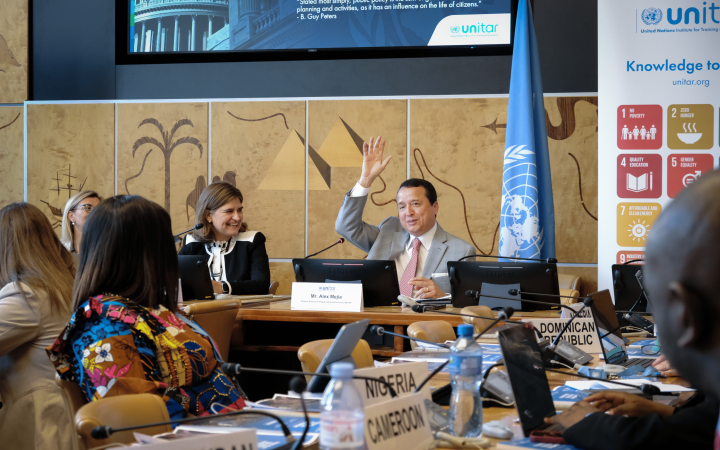Geneva, Switzerland - UNITAR, in collaboration with the Permanent Mission of Peru to the United Nations Office in Geneva, successfully concluded a high-level four-day workshop on public policy for social development.
Held at the Palais des Nations under the auspices of Peru's chairmanship of the G77, the programme brought together diplomats from over a dozen G77 member states to strengthen key competencies in policy analysis, formulation and implementation in support of the 2030 Agenda.
The training, delivered from 16 to 19 June 2025, was led by Mr Alex Mejia, Director of UNITAR's Division for People and Social Development and Head of the CIFAL Global Network, who moderated and delivered multiple sessions.
Participants engaged in an interactive curriculum designed to enhance their understanding of policymaking within complex multilateral environments.
Day 1: Foundations of Public Policy and Inter-stakeholder Simulation
Ms Milagros Miranda Rojas, Deputy Permanent Representative of the Permanent Mission of Peru to the United Nations Office in Geneva, delivered the opening remarks, emphasising the significance of this high-level capacity-building initiative for diplomats.
The workshop began with a session led by Mr Mejia, who introduced the fundamentals of public policy and underscored the crucial role of policy frameworks in promoting inclusive and sustainable development.
The second session was facilitated by Dr Ebru Canan-Sokullu, Deputy Director of the Division, focusing on inter-stakeholder engagement through an interactive simulation exercise. The day concluded with a practical session on water governance and SDG 6, led by Mr Federico Properzi, Chief Technical Adviser at UN-Water, which further enriched participants' understanding of real-world policy challenges.
Day 2: Communication, Policy Economics, and Peacebuilding
The second day commenced with Session 3 on strategic communication, led by Mr Mejia, who emphasised the importance of tailoring messages to diverse stakeholders in complex, high-stakes environments. Mr Mejia highlighted:
To communicate effectively, actors must understand how policymakers engage with stakeholders within their operating environment. This requires decision-makers to develop and implement a clear and effective communication strategy.
In Session 4, Dr Canan-Sokullu examined the role of economics in public policy, focusing on the nuanced balance between equity, equality, and efficiency in decision-making processes. The day concluded with a compelling case study on education for peace as an innovative tool for conflict resolution, presented by H.E. Ambassador David Fernandez Puyana of the University for Peace, who remarked:
We are not facing a crisis of multilateralism; this is a crisis of leadership.
Day 3: Policy Design and Evaluation
The third day of the workshop advanced participants' understanding of policy economics and strategic decision-making in complex governance environments.
In Session 5, Mr Mejia guided participants through the policy formulation process, emphasising the implications of political dynamics in shaping public policy. The session covered critical criteria for selecting effective policy solutions. As Mr Mejía remarked:
Policies and political dynamics play a key role in defining a problem and creating solutions.
Session 6 was led by Dr Canan-Sokullu, who delivered a focused seminar on monitoring and evaluating public policies. She provided a framework for understanding evaluation criteria, discussed various types of evaluations, and outlined how to measure policy outcomes and long-term impact, reinforcing the importance of evidence-based policymaking.
Day 4: Public-Private Partnerships, Global Health Policy, and Regenerative Approaches
The final day began with Session 7, led by Mr Jonas Haertle, Chief of the UNITAR Executive Director's Office, who presented the critical role of public-private partnerships (PPPs) in advancing sustainable development. He also addressed practical challenges encountered in the implementation of PPPs.
Session 8 was conducted by Prof Mike Saks, Emeritus Professor at the University of Suffolk, who explored labour market regulation and the World Health Organization's policy guidelines for health practitioners.
The workshop concluded with Session 9, delivered by Prof Brendon Noble, Director of the Institute for Healthy Urban Living. He introduced the concept of regenerative public policy, urging participants to embrace systemic and innovative approaches to policymaking for sustainable urban development.
Closing Ceremony
To conclude the workshop, H.E. Ambassador Luis Gallegos, former Minister of Foreign Affairs of Ecuador and Chairman of the Global Initiative for Ageing Foundation, presented certificates to the participants and delivered closing remarks. His words, enriched by decades of diplomatic and political experience, left a lasting impression and inspired all those in attendance.
Participants expressed sincere appreciation for the programme's relevance, its practical and actionable insights, and the high calibre of its facilitation. Ms Nadjma Adoum, Permanent Mission of Cameroon, stated:
Having taken part in the workshop on public policy for social development, I was deeply honoured to participate. Above all, I had the privilege of gaining greater preparation as a diplomat on the topic, particularly regarding the challenges and implementation of public policy at the national level, as well as its relevance on an international scale. This experience was enriched by the involvement of outstanding panellists such as Director Alex Mejia.







